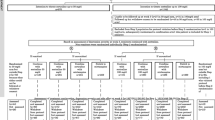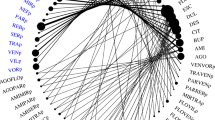Abstract
Background
Antidepressant–placebo differences observed in randomized double-blind, placebo-controlled clinical trials have always been relatively small and have further declined during the past three decades. During this same time, a decrease in patient severity of symptoms at baseline has occurred. The current study was designed to examine antidepressant–placebo difference scores and baseline severity of depression over a 10-year period in a sample of depressed patients enrolled at a single clinical trial site.
Methods
We analyzed data from a total of 462 patients who participated in 16 clinical trials at the Northwest Clinical Research Center, Bellevue, WA between 1995 and 2004. NWCRC collaborated with study sponsors to unblind the randomization codes from 16 trials for 293 patients assigned to antidepressants and 169 patients assigned to placebo.
Results
The mean total baseline HAM-D17 scores were relatively high and stable (mean of 24.7, range 22.2–27.4). The outcome, as measured by changes in mean total HAM-D17 scores between antidepressant and placebo, were similar and were not related to the year of the conduct of the trial. Furthermore, the baseline severity of depressive symptoms, and BMI played a significant role in the outcome with antidepressants and not with placebo.
Conclusions
Our results show that no diminution of drug–placebo difference occurs over time when baseline severity remains constant. As such, they support the importance of depression severity as a determinant of antidepressant–placebo difference.
Similar content being viewed by others
References
Elkin I, Shea MT, Watkins JT, Imber SD, Sotsky SM, Collins JF, Glass DR, Pilkonis PA, Leber WR, Docherty JP et al (1989) National Institute of Mental Health Treatment of Depression Collaborative Research Program. General effectiveness of treatments. Arch Gen Psychiatry 46:971–982
Fournier JC, DeRubeis RJ, Hollon SD, Dimidjian S, Amsterdam JD, Shelton RC, Fawcett J (2010) Antidepressant drug effects and depression severity: a patient-level meta-analysis. JAMA 303:47–53
Khan A, Khan S, Brown WA (2002a) Are placebo controls necessary to test new antidepressants and anxiolytics? Int J Neuropsychopharmcol 5:193–197
Khan A, Leventhal RM, Khan SR, Brown WA (2002b) Severity of depression and response to antidepressants and placebo: an analysis of the Food and Drug Administration database. J Clin Psychopharmacol 22:40–45
Khan A, Broadhead AE, Kolts RL, Brown WA (2005) Severity of depressive symptoms and response to antidepressants and placebo in antidepressant trials. J Psychiatr Res 39:145–150
Khan A, Schwartz K, Kolts RL, Ridgeway D, Lineberry C (2007a) Relationship between depression severity entry criteria and antidepressant clinical trial outcomes. Biol Psychiatry 62:65–71
Khan A, Schwartz KA, Kolts RL, Brown WA (2007b) BMI, sex, and antidepressant response. J Affect Disord 99:101–106
Khan A, Bhat A, Kolts R, Thase M, Brown W (2010) Why has the antidepressant-placebo difference in antidepressant clinical trials diminished over the past three decades? CNS Neurosci Ther 16:217–226
Kirsch I, Deacon BJ, Huedo-Medina TB, Scoboria A, Moore TJ, Johnson BT (2008) Initial severity and antidepressant benefits: a meta-analysis of data submitted to the Food and Drug Administration. PLoS Med 5:e45
Klerman GL, Cole JO (1965) Clinical pharmacology of imipramine and related antidepressant compounds. Pharmacol Rev 17:101–141
Kloiber S, Ising M, Reppermund S, Hortsmann S, Dose T, Majer M, Zihl J, Pfister H, Unschuld PG, Holsboer F, Lucae S (2007) Overweight and obesity affect treatment response in major depression. Biol Psychiatry 62:321–326
Luppino FS, de Wit LM, Bouvy PF, Stijnen T, Cuipers P, Penninx BWJH, Zitman FG (2010) Overweight, obesity, and depression: a systematic review and meta-analyses of longitudinal studies. Arch Gen Psychiatry 67:220–229
National Institute for Clinical Excellence (2004) Depression: management of depression in primary and secondary care. Clinical Practice Guideline No 23. National Institute for Clinical Excellence, London, p 670
Simon GE, Korff MV, Saunders K, Miglioretti DL, Crane PK, van Belle G, Kessler RC (2006) Association between obesity and psychiatric disorders in the US adult population. Arch Gen Psychiatry 63:824–830
Walsh BT, Seidman SN, Sysko R, Gould M (2002) Placebo response in studies of major depression: variable, substantial, and growing. JAMA 287:1840–1847
Author information
Authors and Affiliations
Corresponding author
Rights and permissions
About this article
Cite this article
Khan, A., Bhat, A., Faucett, J. et al. Antidepressant–placebo differences in 16 clinical trials over 10 years at a single site: role of baseline severity. Psychopharmacology 214, 961–965 (2011). https://doi.org/10.1007/s00213-010-2107-1
Received:
Accepted:
Published:
Issue Date:
DOI: https://doi.org/10.1007/s00213-010-2107-1




